CRM Trends for 2019: A CRM Buyer Analysis
In 2018, Software Advice advisors spoke to over 5,000 small business owners seeking to implement new customer relationship management (CRM) software. During these calls, our advisors gather loads of data.
This data gives us insight into the current state of the market. This Buyer Report is designed to let you know the top CRM trends of 2019 so you can make the most informed software decision for your business.
The proprietary data from our conversations with these CRM software buyers shows us a few things:
More and more businesses already have a CRM solution in place
Customization is becoming more important to them
Four markets make up 51 percent of the CRM buyers who call us for assistance
This report will go into our findings and data in great detail to help your SMB identify the top trends among CRM buyers so you’ll be equipped to choose your ideal software solution.
Key Findings
Small businesses are more willing to ditch their CRM system for one that better suits their industry needs. [Read more]
Though the basic contact management functions of a CRM remain the most requested features, the growth in the amount of total requested features indicates a more informed, tech-savvy group of buyers who know what they’re looking for. [Read more]
Fewer CRM buyers are coming straight from manual methods, indicating a higher level of technical literacy in the market. [Read more]
The real estate, consulting, insurance and distribution market segments account for over half of prospective CRM buyers, and those buyers are looking for features that are most useful for their businesses. [Read more]
Small businesses much like yours continue to make up the majority of the calls we receive here at Software Advice. [Read more]
SMBs Are More Willing to Switch to Better CRM Systems
Pain points can be difficult to quantify because each buyer and user will have different CRM needs, but the information gathered by our advisors is still invaluable.
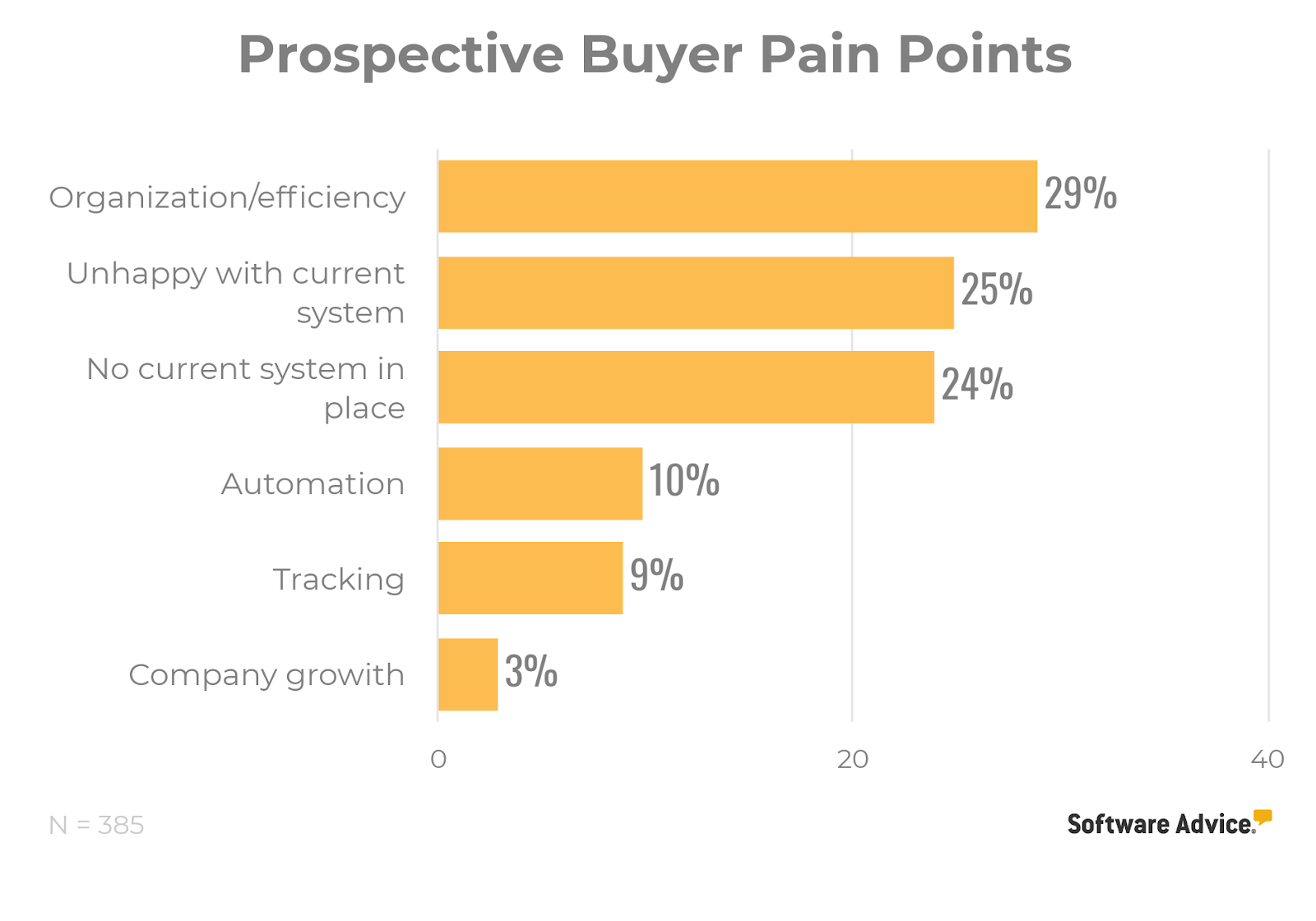
Unsurprisingly, becoming more organized and efficient remains one of the primary reasons a business wants to implement a CRM solution.
However, with the increase in number of businesses already using a CRM, we’ve seen more and more that are unhappy with their current CRM and shopping around for a better solution.
This dissatisfaction is fourfold:
The CRM software is hard to use: Words like “clunky” and “awkward” appeared frequently when users discussed their CRM system. Additionally, many users felt that their employees weren’t buying into using their CRM because it wasn’t intuitive to use.
The CRM software has too many unnecessary features or doesn’t have the right features: Users also indicated their CRM system had too many features that were just going to waste. They were paying for a suite of features they didn’t need, or, even worse, they didn’t have the features their business needed to grow and succeed.
The CRM software costs too much: Even more found that their CRM system cost too much for what they got out of it and were shopping for more price-effective solutions.
The CRM software vendor’s customer service is poor or unhelpful: Our buyers reported having a poor relationship with their vendor when they had questions or concerns about the system they were using.
So, if you’re a business who doesn’t currently have a system in place or you’re shopping for a new CRM, researching the customer experience, usability, required features and cost of prospective CRMs is important.
Demand for More Features Has Grown Across the Board
On the surface, the top-requested CRM features from our buyers do not differ all that much from the top-requested features we found in our last CRM Buyer Report:
Almost everyone wants contact management, interaction tracking and schedule/reminder creation—this is basic CRM functionality.
About a quarter of buyers want sales pipeline and funnel monitoring, and a fifth want sales automation, a central database, email marketing, customization and reporting/analytics—this is slightly more advanced CRM functionality.
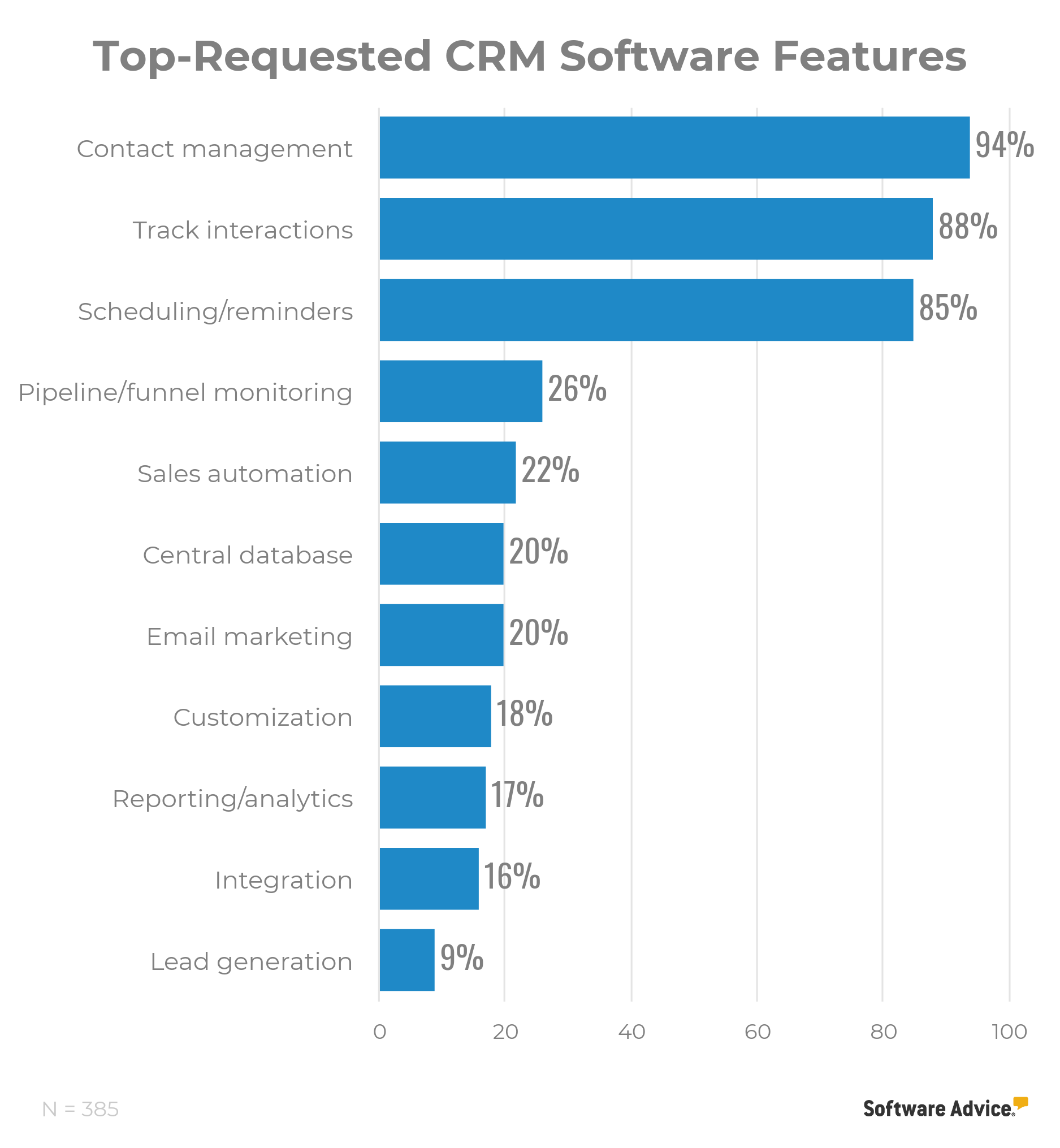
The steady demand for these features is not a surprise since these features are the most intrinsic aspects of CRM.
In our previous Buyer Report, customization was only requested by 5 percent of buyers, but now, one in five are requesting it.
More importance is placed on being able to modify and customize a CRM by:
Adding new fields
Controlling user access
Adding new modules
Creating your own layout
A CRM that allows for greater customization means you’re more likely to get exactly what you want with just a few tweaks.
Most notably, compared to previous years, drastically more features were requested by at least a tenth of our buyers: seven features to 12 features.
This increase indicates buyers have a greater understanding of what features they need in a CRM whether they’re searching for their first one or looking to switch to another, more tailored, solution.
CRM Buyers’ Increasing Level of Technical Literacy
In our previous CRM Buyer Report, half of our buyers were looking for a CRM system to replace manual methods of tracking their contacts and customers.
Again, that number has dropped dramatically; only one-fifth of our buyers are looking to replace manual methods. However, it should be noted that using spreadsheets as a CRM system is just one step above manual methods when it comes to functionality.
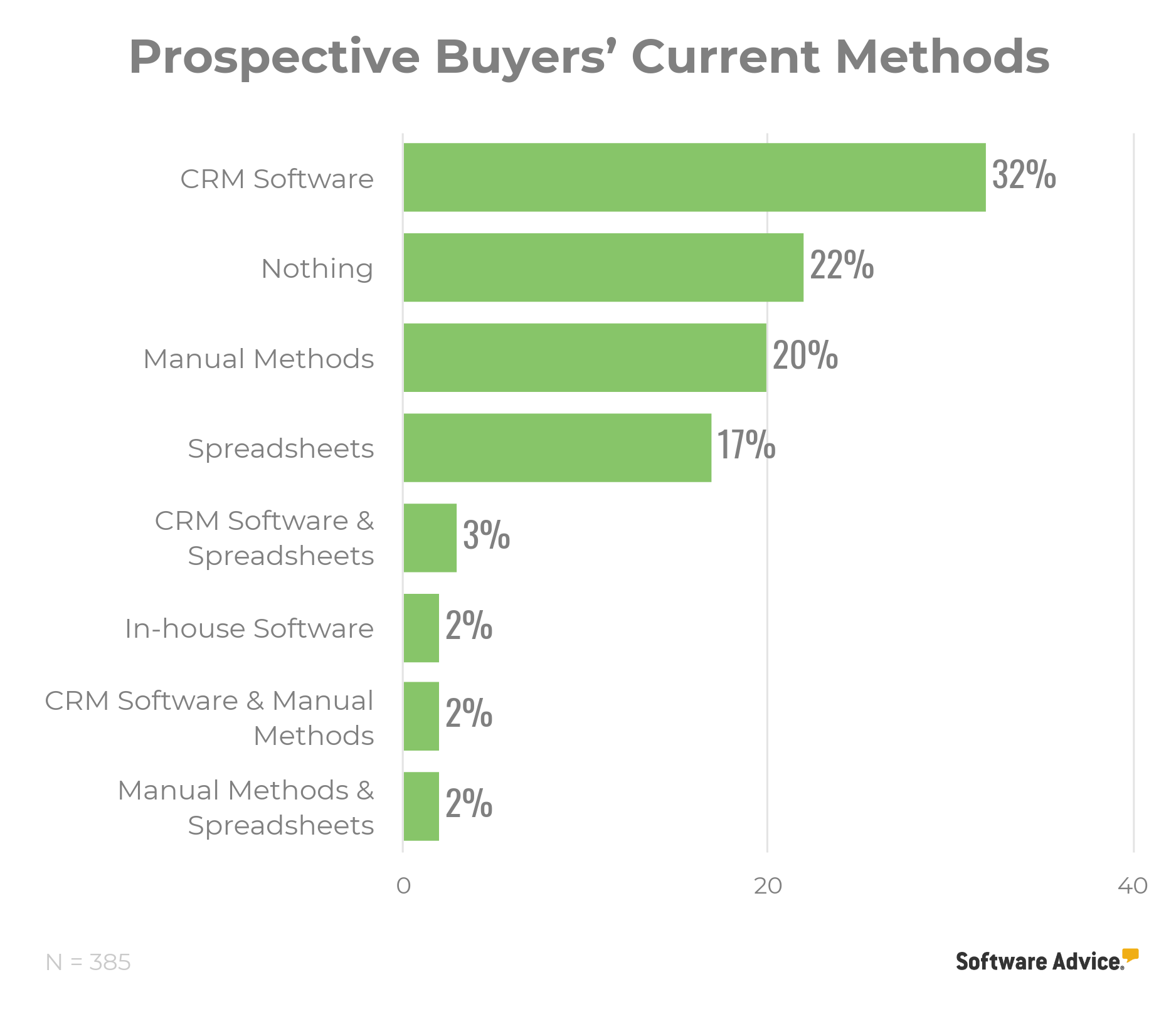
Once again, this change indicates that CRM buyers are showing an increasing amount of technical literacy.
Previously, the majority of buyers were ditching manual methods and coming to software for the first time, but now a third of all buyers are already utilizing a CRM software system and are looking for a change or update.
Additionally, the fact that one-fifth of our buyers are looking to implement a system after having no system in place whatsoever indicates that our buyers know the benefits a CRM system can bring to a business.
Buyers are more discerning now:
More than ever before, a higher level of technical literacy means SMB buyers know what specific features they need.
They are prepared to turn down the features they know they won’t use.
They know the importance of having a CRM system in place.
You need to understand exactly what you need from a CRM system before implementation or else your customers will abandon you for companies with better know-how.
Just a Few Markets Make up Half of CRM Buyers
Buyers are coming from a wide variety of industry segments. Because nearly every business needs some sort of CRM system, it’s not surprising that no single industry accounts for the majority of CRM buyers.
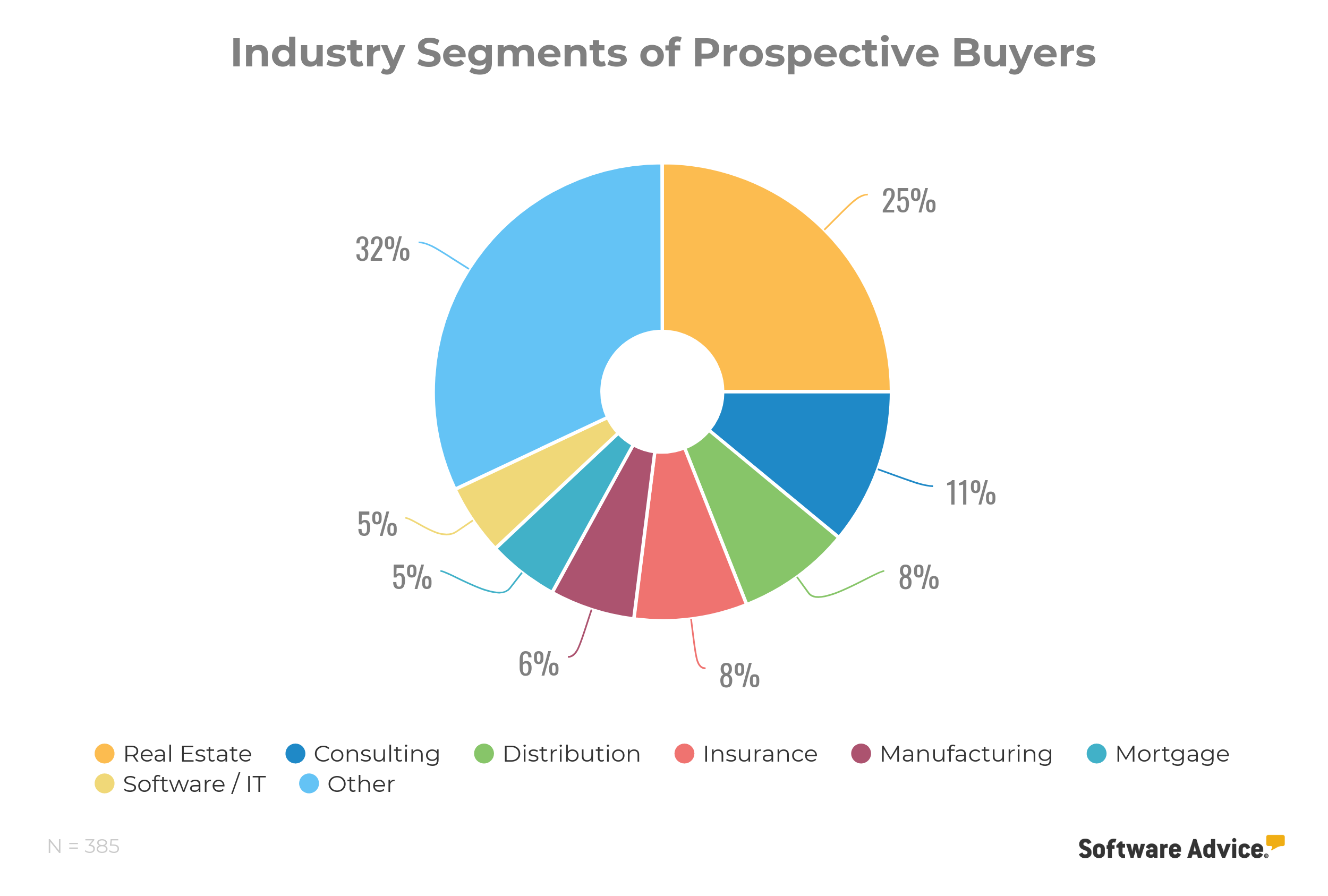
However, over 50 percent of buyers are in one of four markets:
Real estate
Consulting
Distribution
Insurance
The fact that these four industry segments account for over half of CRM buyers is not inconsequential.
What real estate, consulting, distribution and insurance all have in common is the centrality of contact management.
All four industries require that companies carefully track and manage the data from customers, clients and other important contacts. As a result (and as we saw earlier), features like contact management, tracking interactions and scheduling/reminders dominate the field of CRM software.
For buyers in one of these three industries, most CRM vendors will have a product that fits their needs. That said, it still benefits to search for industry-specific CRM solutions when possible because the CRM vendor landscape is large.
Buyers in every industry should be prepared to take one of two different actions:
Clearly communicate to your vendor about your precise, industry-based needs, so that they can either point you to the product that works for your industry or else let you know that they aren’t a good fit for your business.
Search for a niche CRM vendor that specifically serves your industry. Even though these may be smaller vendors, the specificity of the product should provide you with a better experience overall.
Buyers from all industries should find a vendor that provides the features and functionalities that fit their own industry-specific needs whether that’s a large vendor or a more niche, industry-specific vendor.
Demographics
The buyers we surveyed are small business owners and managers who’ve called into Software Advice and shared their organization’s specific problems and needs so that our advisors can direct them to the best software options to fill those needs.
The vast majority of our buyers are SMBs, with annual revenues of less than $1 million. Only 20 percent of our buyers have annual revenues of greater than $5 million.
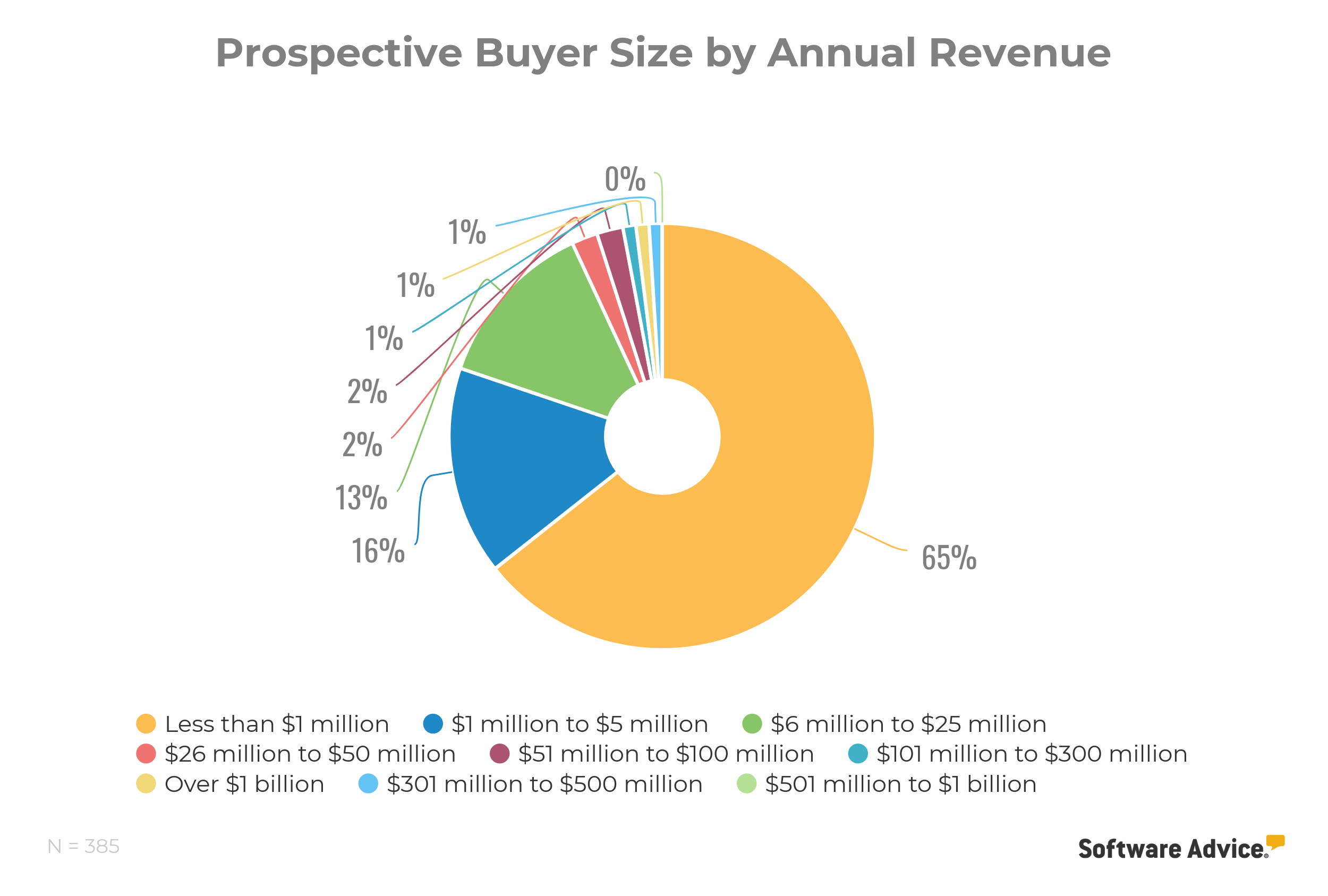
These SMBs are not only small in terms of revenue, but also in regard to their number of employees. Over half of our buyers have five or fewer employees, and only 11 percent have more than 50 employees.
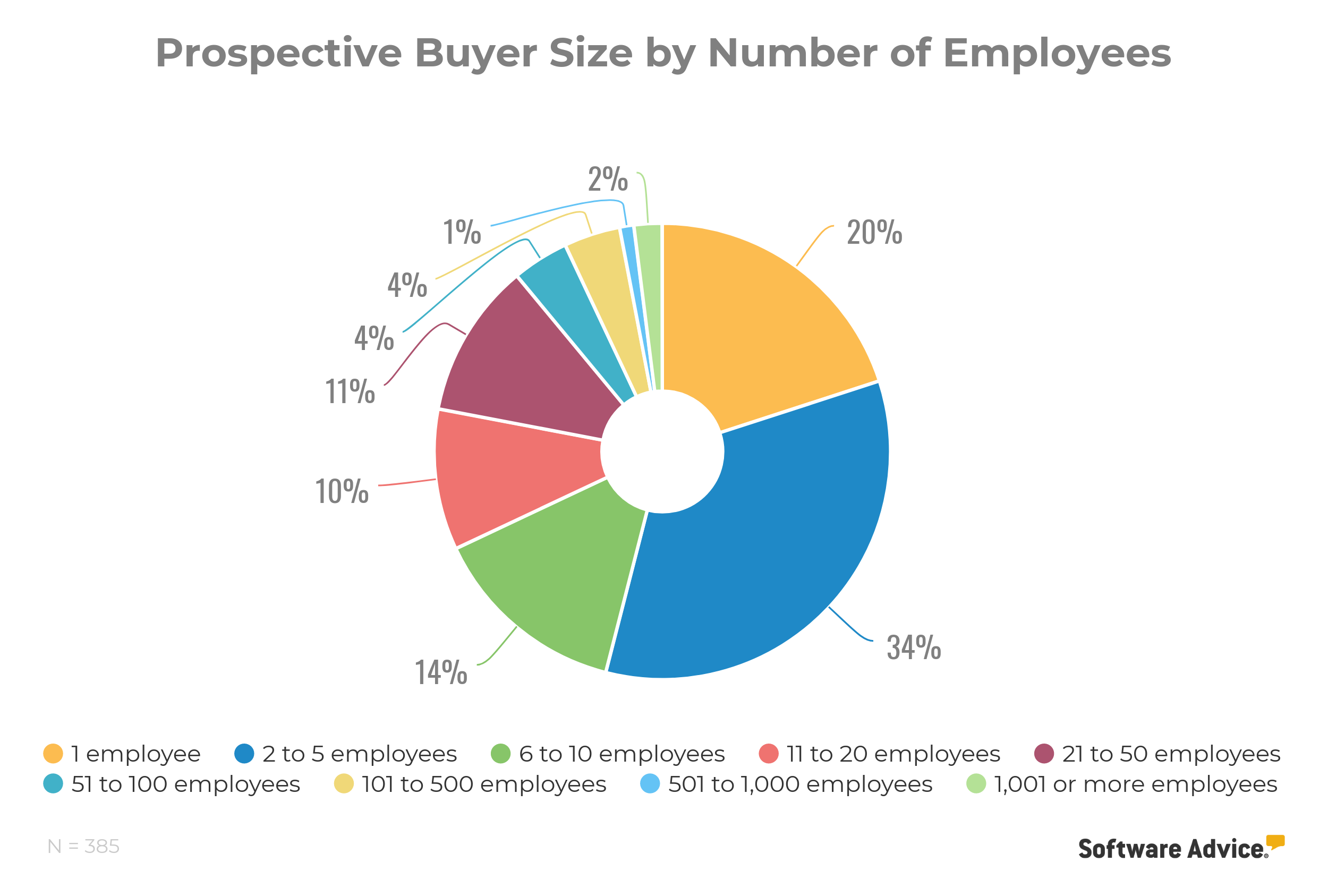
A third way in which our buyers show their relatively small size is in terms of the number of people they’re looking to have use their CRM. Almost 75 percent of these buyers will have five users or fewer, which makes sense given the small number of employees in most of these SMBs.
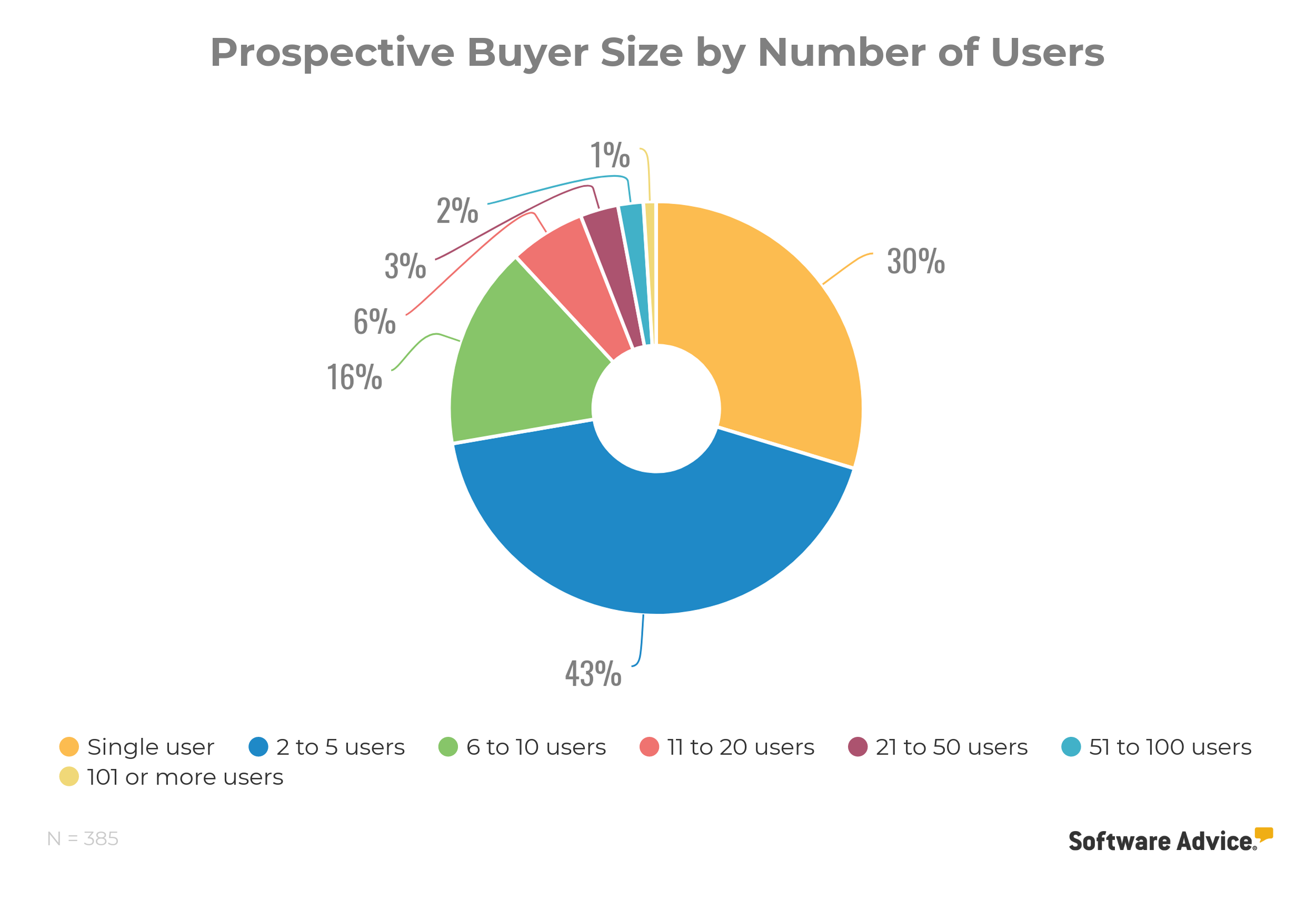
What these demographics show is that our buyers are representative of the SMB space, rather than of larger, enterprise-level businesses and organizations.
Report Methodology
Our advisor team speaks with thousands of buyers who contact Software Advice. For this report, we analyzed a randomly selected 385 phone interactions with small to midsize businesses between January 2018 and December 2018.
These findings exclusively represent those buyers who contacted Software Advice for guidance on CRM software selection, and may not be indicative of the market as a whole.
Chart values are rounded down to the nearest whole number.
Have a question about this report? Email me at collin.couey@softwareadvice.com.